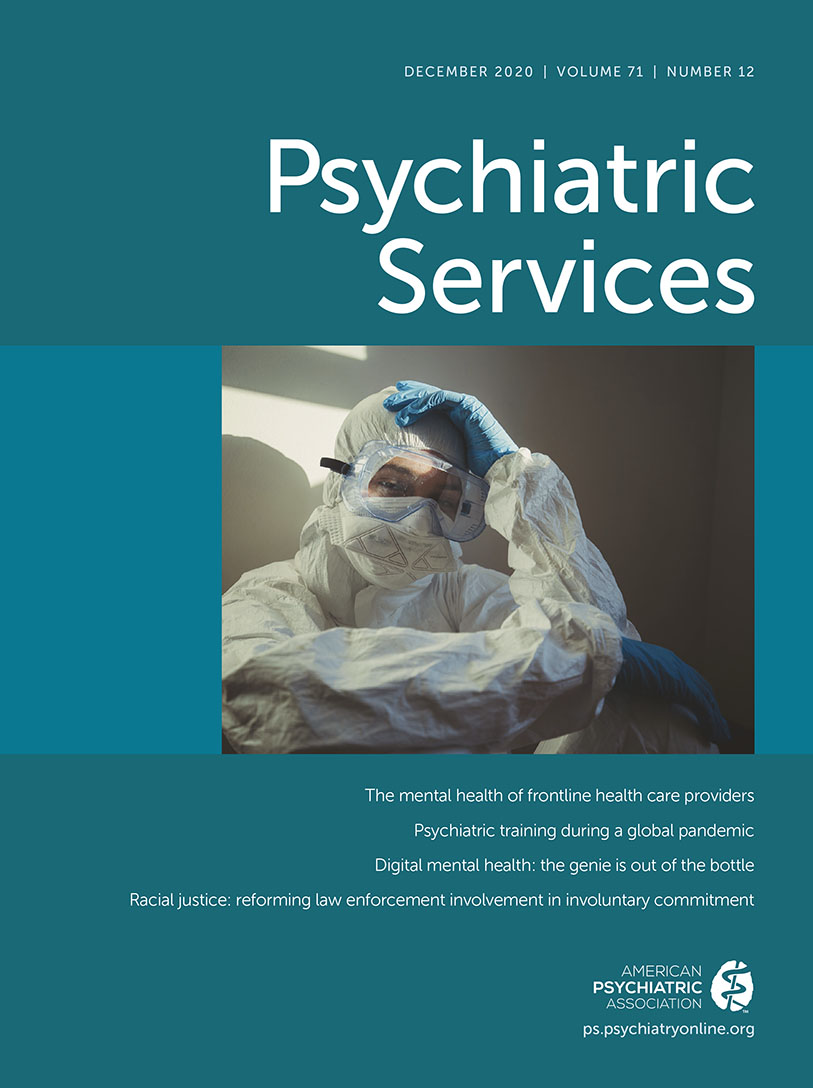The Urgency of Racial Justice and Reducing Law Enforcement Involvement in Involuntary Civil Commitment
This month’s report by Feeney et al. (1) from Dublin, Ireland, documents the rising proportion of involuntary commitments initiated by law enforcement. Although not the focus of the study, the finding of rising law enforcement involvement in involuntary commitment is a disturbing trend, which is likely underestimated if law enforcement transport during involuntary commitment is also considered. At a critical time when stakeholders in the United States are rethinking the role of law enforcement as first responders, a focus on civil commitment is clearly overdue. People from racial-ethnic minority groups, the authors point out, are more likely than nonminority whites to access mental health services through law enforcement involvement, and in the United States there are persistent racial-ethnic disparities in such involvement and in involuntary commitment. Specifically, people who are Black are far more likely to access services via involuntary commitment. As the field struggles with addressing systemic racism, a tangible first step is to commit to minimize law enforcement involvement in mental health crises and involuntary commitment. When law enforcement officers are the first responders in a large proportion of mental health crises, something has badly gone awry. And, as recently documented by the Treatment Advocacy Center, law enforcement members spend considerable time in commitment transport. When clinicians involuntarily commit patients in order to obtain cheap and secure transportation by law enforcement, racial justice is implicitly sacrificed on the altar of cost containment and defensive medicine. To be concrete: a key performance measure for state and local mental health authorities should be the proportion of mental health crises that rely on law enforcement.
Law enforcement encounters with persons of color during involuntary civil commitment all too often lead to violence. With the exception of crisis intervention training, police and law enforcement receive scant training in working with persons with mental illness, and because of racial discrimination, stigma, poverty, and lack of insurance coverage, persons of color are disproportionately subjected to involuntary civil commitment. Reducing law enforcement encounters with persons of color under commitment is achievable and is one tangible step toward reducing potentially tragic law enforcement interactions.
Under civil commitment, persons are apprehended and often handcuffed or restrained while in transit to treatment facilities and courthouses for commitment hearings. In contrast, in medical emergencies, most patients are transported by trained emergency medical personnel. Unfortunately, many state and local authorities rely on law enforcement to initiate or transport persons with mental illness under civil commitment. Such transport and long waits during commitment evaluations strain law enforcement personnel, who are ill trained to provide mental health care. Families and friends are often disinclined to pursue commitment to help their loved ones, fearing it could cause more harm than good. Civil commitment lies outside of the criminal justice system, although custody and transportation under civil commitment are often the responsibility of law enforcement. Persons of color and others affected by involuntary civil commitment find law enforcement custody frightening and stigmatizing.
There are many effective crisis response models that reduce law enforcement involvement. Diversion models, such as mobile crisis teams, dispatch outreach crisis teams to the scene and call for law enforcement only when clearly needed. Some model programs deploy highly trained persons with lived experience to de-escalate crises. Many permutations and combinations of crisis and recovery centers with varying degrees of psychiatric expertise are also promising alternatives. In coresponse models, when police are called to crises, they are joined on the scene by mental health workers and aim to reduce the need for further police response. Transport by trained mental health personnel is another option. Telehealth models can reduce law enforcement transport; even commitment hearings can be conducted virtually. A key outcome measure for implementation should be the extent to which the new diversion models reduce legal sanctions and keep the crisis in the hands of mental health personnel.
The heightened attention to racial justice offers compelling rationales to encourage these humane and just reforms.
1 : Police involvement in involuntary psychiatry admission: a report from the Dublin Involuntary Admission Study. Psychiatr Serv 2020; 71:1292–1295Abstract, Google Scholar



